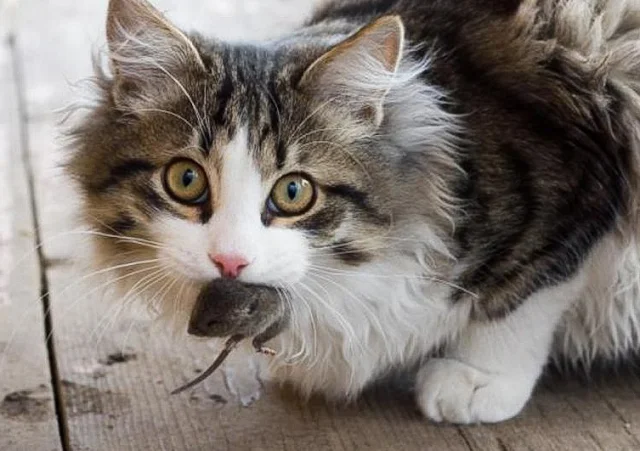A form of feline behaviour which all cat owners are aware of and which the experts have spoken of is bringing prey animals back into their caregiver's home where they either eat the mouse if it's dead or they 'play' with it until it dies and then perhaps eat it.
 |
| Cat bringing prey home. Image in public domain. |
Normal explanation
The normal theory for this form of cat behaviour is that domestic cats are bring their prey back to their natal den within their natal range because they have the mental state of a kitten and they are kept in that state by their human care givers who provide for them completely. They are bringing prey back to their mother in the den as she teaches them how to hunt (and see below - role reveral).
That is my preferred theory.
New theory
A new theory has been proposed by Celia Haddon in conjunction with Dr. Daniel Mills FRCVS in their book Being Your Cat: What's Really Going on in Your Feline's Mind.
They say that domestic cats bring their prey to their owner's home because they want to play with it without being attacked by a predator. I have thought about this and these are my thoughts if you are interested.
Their suggestion indicates that the domestic cat makes a positive rational decision to bring prey back into the security of their owner's home to avoid predators and where they will have time to be cruel (in the eyes of humans) to the prey animal by playing with it.
Reasoning
Cats don't make rational decisions like that. They make instinctive decisions based on indoctrination. And their answer begs the question as to why domestic cats "play" with prey? The classic answer to that is that cats are not deliberately playing with a mouse to be cruel.
Because they normally have little opportunity to exercise their natural desires to hunt, they want to extend the hunt by not killing the mouse immediately.
Secondly, they want to play safe by battering the mouse and killing it in a safe way rather than placing their mouth up to it and getting a bite which may harm them.
These are the classic responses to that scenario and I prefer them. The one aspect of Celia Haddon and Dr. Daniel Mills' response which is correct is that domestic cats will go back to the security of their home but this is for a general reason of security and to bring the prey animal back to their owner who is their surrogate mother.
Role reversal
Sometimes domestic cats kill the prey animal in a role reversal. In the wild, the mother teaches her offspring how to kill animals in the den. And in the classic domestic cat-to-human relationship, the cat is the kitten and the human is the mother.
But when an adult cat brings prey back home, they become the mother and the human becomes the kitten. The position in which the domestic cat is placed in the human home can be confusing to them.
For example, it is automatically confusing for them to be constantly provided for as if they are kittens. They never grow up and have the opportunity to adopt the mentality of an adult cat except when they are allowed outside and suddenly within seconds, they become a wildcat until they return home again where they flick the switch and within about 15 minutes become a tame human companion.
At that point in time, they are adults as they've just left the wild. When cats are outside, they become adult wildcats. Back inside the home and they adopt the characteristics of a tame kitten.


